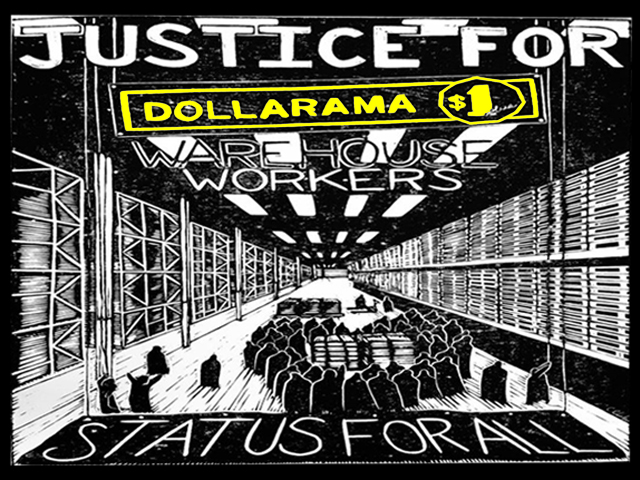RISKORAMA
Union uses investments to press for Dollarama worker protections

UNIONS MATTER, EVEN IF YOU DON’T HAVE ONE. The B.C. Government and Service Employees’ Union (BCGEU) proved that to Dollarama warehouse workers in Quebec June 9.
The BCGEU owns shares in Dollarama. It used its shareholder standing to force a shareholder vote calling for an investigation into the hiring procedures and the safety of working conditions in Dollarama operations.
Delivers a strong message
Twenty-one percent of Dollarama shareholders voted for the BCGEU proposal—in spite of the Dollarama board recommending against the measure.
“The BCGEU used our power as a responsible investor to deliver a strong message to all Dollarama shareholders regarding the company’s treatment of warehouse and distribution centre workers,” said BCGEU president Stephanie Smith.
“We didn’t win. But we didn’t exactly lose either,” said a Dollarama worker activist in Montreal. “The BCGEU helped us remind the boss that warehouse workers are not alone and that others are watching how they treat us.”
Smith points out the support for the BCGEU proposal from more than one-in-five Dollarama shareholders represents billions of dollars in share value.
“That’s a strong message that we’re on the right track and we need to keep pushing,” said Smith.
McGill University project on side
Concern for the rights of Dollarama workers is not just a union affair. The McGill University Corporate Accountability Project sent out an email outlining the basics of the issue and urging big shareholders to vote for the BCGEU proposal.
The McGill email explained: “Dollarama’s six warehouses and its major distribution centre use a migrant workforce, including asylum seekers and undocumented workers, that is trained and hired by temporary placement agencies.
“ ... [A] 2016 report, by the Director of Public Health of Montreal, noted that temporary placement agencies create a “high” and “extreme” risk of occupational injuries.
“Major Dollarama competitors do not use staffing agencies for their warehouse and distribution centers. The above cited concerns have been those surfaced directly by Dollarama warehouse workers and their allies within Montreal’s migrant community.
“The BCGEU’s proposal asks that Dollarama outlines how it assesses and mitigates the human rights risks that arise out of third-party staffing agencies.
Dollarama is big business. It was founded in Matane, Quebec, in 1992. It now has over 1,000 locations across Canada and employs over 20,000 retail employees. Its head office, distribution centre, and warehouses are all located in the Montreal area. The corporation expects to open more than 600 new stores by 2029.
Dollarama reported profits of $86.1 million in the first quarter of 2020—a period when many businesses had no profits at all, as a result of having to shut down due to COVID-19.
‘Dollarama is our Amazon’

“Dollarama is not some mom and pop operation,” says Mostafa Henaway, an organizer with the Immigrant Workers Centre. “It’s a multinational corporation. It has investments from Bain Capital, Mitt Romney’s hedge fund, and it’s expanding into Central America.”
Dollarama sets the standards for what working conditions are like in the whole warehouse and logistics industry in Montreal, says Henaway. With around 1,000 employees, representing 5 to 10 per cent of the city’s warehouse workers, Dollarama is able to “be the model of how you make a profit in the industry.”
Nearly a quarter of warehouse workers have suffered injuries at work. The majority of workers are given zero sick days, and nearly 40 per cent received no health and safety training.
“Dollarama needs to be a focus for us, in the same way that Amazon is a focus for the labour movement around the world. We’re making the argument that Dollarama is our Amazon,” says Henaway.
For Henaway, the pandemic has added urgency to the campaign to organize Dollarama workers.
“This is a critical moment, where workers are willing to take actions that they weren’t ready to six months ago,” he says. “Our role is to be able to support that.”
- 30 -













Add new comment